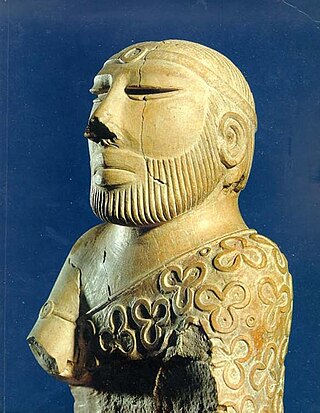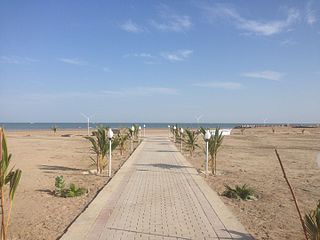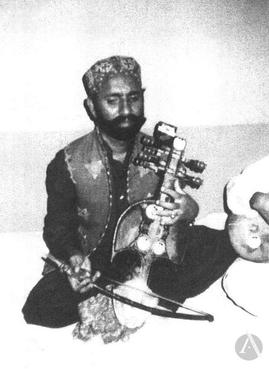
Balochistan is a province of Pakistan. Located in the southwestern region of the country, Balochistan is the largest province of Pakistan by land area but is the least populated one. It is bordered by the Pakistani provinces of Khyber Pakhtunkhwa to the north-east, Punjab to the east and Sindh to the south-east; shares international borders with Iran to the west and Afghanistan to the north; and is bound by the Arabian Sea to the south. Balochistan is an extensive plateau of rough terrain divided into basins by ranges of sufficient heights and ruggedness. It has the world's largest deep sea port, the Port of Gwadar lying in the Arabian Sea.

Makran, also mentioned in some sources as Mecran and Mokrān, is the southern coastal region of Balochistan. It is a semi-desert coastal strip in the Balochistan province in Pakistan and in Iran, along the coast of the Gulf of Oman. It extends westwards, from the Sonmiani Bay to the northwest of Karachi in the east, to the fringes of the region of Bashkardia/Bāšgerd in the southern part of the Sistan and Baluchestan province of modern Iran. Makrān is thus bisected by the modern political boundary between Pakistan and Iran.

The Baloch or Baluch are a nomadic, pastoral, ethnic group which speaks the Western Iranic Baloch language and is native to the Balochistan region of South and Western Asia, encompassing the countries of Pakistan, Iran, and Afghanistan. There are also Baloch diaspora communities in neighbouring regions, including in Central Asia, and the Arabian Peninsula.

Sistan and Baluchestan province or Asli Baluchestan is the second largest province of the 31 provinces of Iran, after Kerman province, with an area of 180,726 km2. It is in the southeast of the country, bordering Afghanistan and Pakistan, and its capital is the city of Zahedan.
Zikrism is a Mahdist minority Muslim group or sect found primarily in the Balochistan region of western Pakistan. The name Zikri comes from the Arabic word Dhikr.

The history of Balochistan refers to the history of the Balochistan region of Pakistan, Iran and Afghanistan. Vague allusions to the region were found in Greek historical records of around 650 BCE. Prehistoric Balochistan dates to the Paleolithic.

Pasni, is a city and a fishing port in Gwadar District, Balochistan, Pakistan. It is located on the Makran coast on Arabian Sea about 450 km (280 mi) from Karachi. Administratively, Pasni is the headquarters of Pasni Tehsil, the sub-division of Gwadar District. Astola Island lies 40 km (25 mi) ESE of Pasni, in the Arabian Sea. The city of Pasni is itself administratively subdivided into two Union Councils.

Turbat is a city in southern Balochistan, Pakistan. It is the administrative centre of Kech District. Situated on the bank of the Kech River, Turbat was the historical capital of the State of Makran. Turbat is the second-largest city in Balochistan after Quetta and the 38th largest city of Pakistan. It is the largest city in the southern part of the province. The Gwadar Port lies 180 kilometres (110 mi) to the southwest of Turbat.

Las Bela was a princely state in a subsidiary alliance with British India which existed until 1955. The state occupied an area of 18,254 km2 (7,048 sq mi) in the extreme southeast of the Balochistan region, with an extensive coastline on the Arabian Sea to the south. Las Bela was bordered by the princely states of Kalat and Makran to the north and west. To the east lay the province of Sind and to the southeast lay the Federal Capital Territory around the city of Karachi.

Balochistan is a historical region in Western and South Asia, located in the Iranian plateau's far southeast and bordering the Indian Plate and the Arabian Sea coastline. This arid region of desert and mountains is primarily populated by ethnic Baloch people.

The suroz is a bowed string instrument with a long neck, similar to a fiddle or sarangi and played vertically. It is considered the traditional instrument of the Baloch people in Balochistan.
There are several ethnic groups in Afghanistan which traditionally lead a peripatetic life. This means they are nomadic and their main occupations centre around providing services to the settled populations they travel among, like peddling particular goods or performing music. In this way, they contrast both with the settled population and with the pastoralist nomads. They are of low social status and are known to outsiders as Jats, a derogatory term that none of the groups use as a self-designation.

Hingol National Park or Hungol National Park is one of the largest national parks in Pakistan, located in the Makran coastal region. The park covers an area of about 6,100 square kilometres (2,400 sq mi) and is located 190 km from Karachi in the three districts of Gwadar, Lasbela and Awaran in Balochistan. Hingol was declared a national park in 1988.
The Med, Medh or Meid are an indigenous Sindhi fishermen community found in the coastal areas of Balochistan, Pakistan, mainly in the regions of Makran, Las Bela, Hub and southern Sindh, and the Makran region of Sistan and Baluchestan Province of Iran.

The Jiwani Coastal Wetland is a wetland located in Balochistan, Pakistan, near the town of Jiwani. The site is one of the 19 Ramsar sites in Pakistan and was inducted in 2001.
Terrorist incidents in Pakistan in 2019 include:
The Jadgal is an Indo-Aryan ethno-linguistic group which speaks the Jadgali language. Jadgals are present in the Balochistan region of Iran and Pakistan, as well as in Oman.
The Jats of Balochistan are tribes of Jat origin found in the Balochistan province of Pakistan. They are estimated to be around 10% of the total population of Balochistan, being the fourth largest ethnic group of Balochistan. A large proportion are in the profession of camel herding. Jadgals are another Jat ethnic group living in Balochistan.
The Sindhis of Balochistan are an indigenous Sindhi population living in Balochistan, Pakistan.
Balochi music is the musical traditions of the Baloch people and music in the Balochi language. The Baloch people have a rich oral tradition that includes poems and songs to celebrate or commemorate many events such as religious rites, festivals, or holidays and dance.











